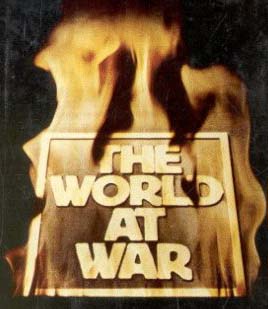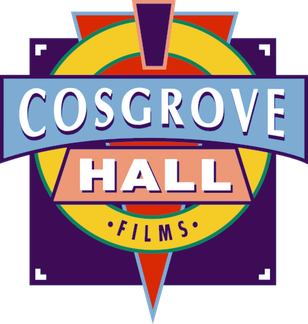Related Research Articles

ITV Granada, formerly known as Granada Television, is the ITV franchisee for the North West of England and Isle of Man. From 1956 to 1968 it broadcast to both the north west and Yorkshire on weekdays only, as ABC Weekend Television was its weekend counterpart. Granada's parent company Granada plc later bought several other regional ITV stations and, in 2004, merged with Carlton Communications to form ITV plc.
Verity Ann Lambert was an English television and film producer.

The World at War is a 26-episode British documentary television series that chronicles the events of the Second World War. It was produced in 1973, at a cost of £900,000, the most expensive factual series ever produced. It was produced by Jeremy Isaacs, narrated by Laurence Olivier and included music composed by Carl Davis. The book, The World at War, published the same year, was written by Mark Arnold-Forster to accompany the TV series.

Cosgrove Hall Films was an English animation studio founded by Brian Cosgrove and Mark Hall; its headquarters was in Chorlton-cum-Hardy, Manchester. Cosgrove Hall was once a major producer of children's television and animated programmes/films; Cosgrove Hall's programmes are still seen in over eighty countries. The company was wound down by its then owner, ITV plc, on 26 October 2009. It was mainly known for its series Danger Mouse, The Wind in the Willows, and Count Duckula.

Peter Salmon is a British television producer and executive. He is Chief Creative Officer of global content creator, producer and distributor Endemol Shine Group, leading the company’s creative direction globally and overseeing the Group’s UK business. Prior to taking his current role in April 2016, Salmon was Director of BBC Studios, the corporation's production arm, and before that held a number of senior BBC roles including Chief Creative Officer of BBC Vision, effectively overseeing all of BBC television's in-house programme production, and Director of BBC North.
Matthew David Jones is a British television screenwriter and television producer, who has worked on a variety of popular drama programmes for several television networks in the UK.
Antony Root is a British television executive and producer. He has worked in the United Kingdom, Europe and the United States. He was formerly Executive Vice President of Original Programming and Production for HBO Europe and Head of Original Production for WarnerMedia EMEA. He retired from this position in March 2023.
The 2005 British Academy Television Awards were held on Sunday 17 April at the Theatre Royal, Drury Lane in London. The ceremony was hosted by Irish comedian and television presenter Graham Norton.
The 2004 British Academy Television Awards were held on Sunday 18 April at the Grosvenor House Hotel in Park Lane, London. The ceremony was hosted by Davina McCall and broadcast on ITV the following day.
The 2002 British Academy Television Awards were held on Sunday 21 April 2002. The ceremony was hosted by the television presenter Chris Tarrant and broadcast on ITV the following day.

Top Gear was a British motoring magazine programme created by the BBC and aired on BBC Two between 22 April 1977 and 17 December 2001. The programme focused on a range of motoring topics, the most common being car reviews, road safety and consumer advice. Originally presented by Angela Rippon and Tom Coyne, the show saw a range of different presenters and reporters front the programme's half-hourly slots, including Noel Edmonds, Jeremy Clarkson, Tiff Needell, William Woollard and Quentin Willson. The programme proved popular during the late 80s and early 90s, and launched a number of spin-offs, including its own magazine entitled Top Gear Magazine.
Christine Langan is an English film producer who was appointed Head of BBC Films in 2009. In 2016, she left the role to become CEO of comedy television production company Baby Cow Productions.
Sir John Denis Forman was a Scottish executive in the British television industry long associated with the ITV contractor Granada, and with various charitable and governmental bodies in the arts.

Andrew Harries is chief executive and co-founder of Left Bank Pictures, a UK based production company formed in 2007. In a career spanning four decades he has produced television dramas including The Royle Family,Cold Feet, the revivals of Prime Suspect and Cracker, as well as the BAFTA-winning television play The Deal.
David Ian Gill was a British film historian, preservationist and documentarian who documented the history of motion pictures and helped restore many early, silent films.
David Edward Rose was a British television producer and commissioning editor.
The 15th International Emmy Awards took place on November 23, 1987, in New York City. The award ceremony, presented by the International Academy of Television Arts and Sciences, honors all programming produced and originally aired outside the United States.
Brian Tesler is a British television producer and executive. His career encompassed British television's post-war evolution from a single-channel BBC to the beginning of today’s multitude of cable and satellite channels. He worked as a producer for Independent Television, as well as the BBC.
Stephen Garrett is a British film and television producer. He is best known for founding the Kudos production company, and executive producing the BBC spy drama Spooks. As a film producer and executive producer, his credits include Eastern Promises (2007), Miss Pettigrew Lives for a Day (2008), Salmon Fishing in the Yemen (2011) and The Night Manager (2016). In 2016, he launched a new production company, Character Seven.
References
- ↑ "No. 54427". The London Gazette . 14 June 1996. p. 2.
- ↑ Attias, Elaine. "Britain's exciting Channel 4 breaking all the TV rules", Toronto Star , 1 November 1986. Accessed 31 August 2011. "In his early 50s, he is a personal and passionate man who went from Scottish Jewish roots to a philosophy degree at Oxford, presidency of the Oxford Union and on to top programming positions at Thames and Granada television, Britain's powerful commercial independents."
- ↑ Levens, R.G.C., ed. (1964). Merton College Register 1900–1964. Oxford: Basil Blackwell. p. 425.
- ↑ Isaacs, Jeremy (6 September 2008). "My mentors". The Guardian. London.
- ↑ cnn.com/ColdWar at Internet Archive
- ↑ Shales, Tom (9 October 1999). "A Journey Of aThousand Years". Washington Post. ISSN 0190-8286 . Retrieved 24 August 2018.
- ↑ Storm Over 4, Jeremy Isaacs, 1989.
- ↑ Leapman, Michael (20 September 1989). "Channel 4 could still be a rather good delicatessen" . The Independent. Archived from the original on 8 June 2022.
- ↑ "Screen: Buzz", The Sunday Times, 3 January 1988